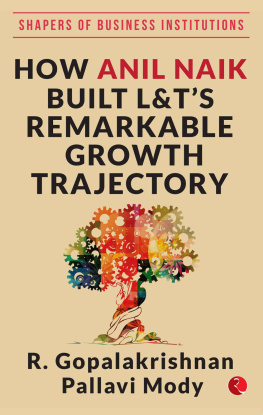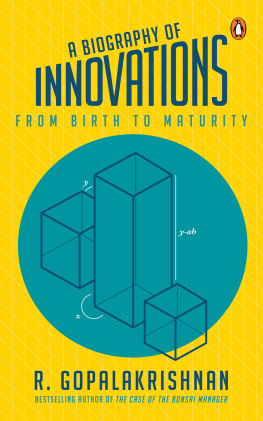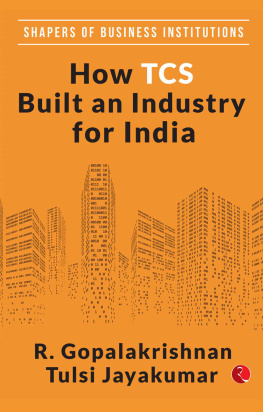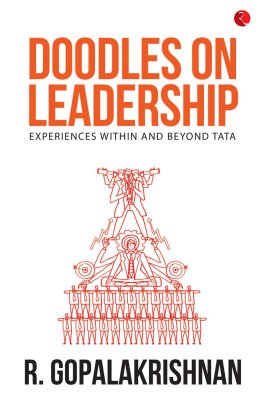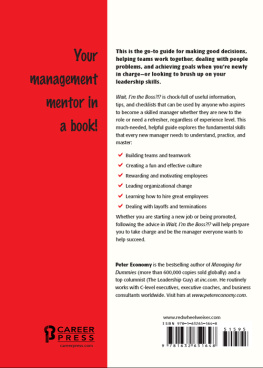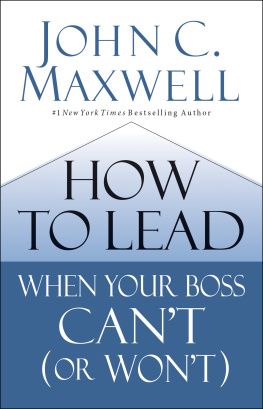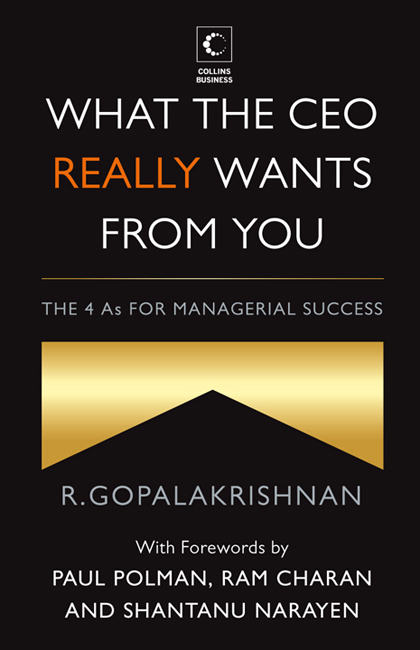WHAT THE CEO
REALLY WANTS
FROM YOU
THE 4 AS FOR MANAGERIAL
SUCCESS
R. GOPALAKRISHNAN
With Forewords by
PAUL POLMAN, RAM CHARAN AND
SHANTANU NARAYEN

I dedicate this book to the many subordinates, peers and bosses with whom I have worked for over forty-five years.
I thank all of them because they forgave my faults as a coworker and gave me a chance to learn from my mistakes, which is why I have written this book.
I injured some, but since I could not repair the injuries I had done, I have tried to make amends by benefiting others.
W. Somerset Maugham,
A Writers Notebook
CONTENTS
N EGOTIATING AN
A MBIGUOUS
E NVIRONMENT
T he world is changing at a faster rate than I can remember at any stage during my thirty-odd years in business. Power is shifting steadilybut inexorablyfrom west to east. Digitization is transforming the way we work and putting power directly into the hands of ordinary citizens. Our current form of capitalism is under question by many and the environment is under threat. Never has the need for leadership been greater.
The implications of these changes for business are profound. The world of work my three sons are entering today is almost unrecognizable from the one I knew at their age. Navigating the intricacies of this highly complex and interdependent world is no easy task. Unfortunately, there are no rule books. The old certainties have gone forever. As I frequently tell my Unilever colleagues, those who succeed in this environment will be those who learn to live with ambiguity. But also those who understand the power of collaboration better than others. The challenges are simply too big to undertake alone.
Partnerships with others, but above all with your direct boss and organization, are more important than ever before.
The term over-ambitious simply does not apply when you look at the scale of the challenges we have to solve in this current era. There is a fundamental readjustment going on as a result of the financial crisis, with a move from a rules-based society back to a principle- and values-led society. In this environment, cooperation is more important than ever.
Living with ambiguity would have been an equally appropriate title for this book. At its heart is the need for todays manager to constantly change and adapt in response to fast-moving events. However, unlike the plethora of books on how to be a better leader in this kind of environment, the focus of this work is on how to be better led. As such it provides a refreshing and distinctive approach. It explores the many ways in which to build that essential foundation of trust between leaders and managersfrom more open conversations to the need for greater self-awareness. In this increasingly interdependent world, relationships and EQ are vitally important. So is the need to be driven by our internal compass, based on deep values and strong beliefs. I have certainly benefited during my career most when working the 4 As, so eloquently described by Gopal, and above all when my direct bosses understood them as well.
The strength of this book, in my view, also comes from two other factors.
First, the authority and experience of its author. Few people can lay claim to the career of R. Gopalakrishnan. The impact of his more than thirty years at Unilever is still felt today, more than fourteen years after he left. HUL, an admired institution for leadership development, would not have been what it is today without the passion for people and organization that Gopal championed throughout his career. He is a business heavyweight in every sense of the word and the benefit of his wisdom and experience shines through on every page.
Second, the guidance offered in this book is brilliantly illustrated and supplemented through a series of case studies. This is not some theoretical or abstract tome. As you would expect of a businessman of more than forty years standing, it is an immensely practical work, rooted in many real life examples for us to follow.
I am delighted to recommend this book and honoured to be asked to contribute a foreword. As Gopal rightly suggests, a career is a journey of constant and continuous learning. Wherever you happen to be on the journey, this book will help to guide the way.
| London | PAUL POLMAN, |
| 12 June 2012 | Chief Executive Officer, Unilever |
A DOPTING A
D ISTINCTIVE A PPROACH
I have known Gopal off and on for several years from his Unilever days. I am very happy to provide a few words as a perspective foreword to a remarkable book by Gopal. It is important for the development of any profession that experienced practitioners share their views with future practitionersand that is exactly what Gopal has set out to do. All managers do not write and neither are all writers, good managers. Gopal combines both skills and so this book is special.
In 2000, I wrote a slim volume, What the CEO Wants You to Know, aimed at the rational, logical part of the brain. The book outlined in jargon-free language the basics of what business and commerce are all about. I stated that managers need to carry business knowledge in its simplest form, common sense, into solving complex business problems. I had argued that the task of a good leader is to simplify complexity, which is the packaging in which all business problems come dressed.
Gopals book seems to address another side of the same coin. It is aimed at the emotional part of the brain. It is a distinctive and different approach. Each of us has a world view, an outlook and a mindset which shapes the way we view issues. For sure the world of the manager is influenced by the rational as well as the emotional parts of the brain.
When it comes to soft subjects like boss-subordinate relationships and obligations to the company, upcoming managers tend to view them from their background and perspective. Almost always they think more deeply about what the boss and company owes them, and more lightly, about what they owe in return. Upcoming managers read articles and books about leadership (I hope they do!) and subconsciously emulate the behavioural practices of people who have already become iconic leaders. Force fitting their work environment and behaviour into their preconceived mental models regrettably scuttles many a promising career.


